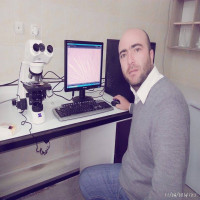Research Article
Issue Reviewers




Aim & Scope
Journal of Erciyes Agriculture and Animal Sciences is the scientific publication of Erciyes University Seyrani Faculty of Agriculture.
Journal of Erciyes Agriculture and Animal Sciences is a international, periodical and peer-reviewed scientific journal that publishes original articles produced in the fields of agriculture and animal husbandry. Turkish and English articles are accepted and 2 issues are published online per year.
Author Guidelines
WRITING RULES
Article Language: The manuscript language can be Turkish (English abstract is mandatory) or English (English articles will be given priority). For articles, tables, graphics and bibliography, the font must be Times New Roman and 12 pt.
Title: It should be short and descriptive, 12 point and bold in Times New Roman font, the first letter of the words should be capitalized, centered and should describe the work as soon as possible. Name and institution information of the authors should be given under the title and the responsible author should be indicated and e-mail address should be given. English title should be written exactly before the Abstract and Turkish Abstracts and Keywords should be written exactly in Turkish, Times New Roman font should be 12 pt, bold and centered.
Abstract and Key Words: Each of the abstracts in Turkish and English should not exceed 300 words. Türkçe Abstract ”and“ Abstract sırasıyla words should be used in Turkish and English abstracts respectively.
At least 4, at most 6 keywords should be written under 1 line of the Turkish and English abstracts, with the first letter of the keyword in uppercase and lowercase letters, if possible, not used in the title, to best describe the study and with a comma (,) between them.
1. INTRODUCTION
In this chapter; study subject, justification, previous studies directly related to the subject and the purpose of the study are given.
2. MATERIALS AND METHODS
The material and method used should be given under the same title. If the subtitle is to be given, it should be numbered with the section number (such as 2.1) and italicized. New or modified methods should be described in such a way as to allow employees to repeat the research on the same subject.
3. RESEARCH FINDINGS AND DISCUSSION
Obtained findings should be given and if necessary, the findings should be supported by tables, figures and graphics.
Obtained findings should be given either as chart or graph in order to avoid repetition. The factors that are found to be statistically significant should be interpreted with the comparison method appropriate to the applied statistical analysis technique and the relevant statistics should be lettered. In cases where the statistical analysis method is not selected correctly and / or the analysis is not performed properly, the editorial board may exclude the article from the evaluation. Findings should be discussed but unnecessary repetitions should be avoided. The similarities and differences of the findings with other studies should be given and the reasons should be explained.
4. RESULTS AND RECOMMENDATIONS
The results obtained should be given concisely with their contribution to science and practice. The statements given in the Introduction and Research Results and Discussion section should not be repeated in this section in the same way.
THANK
If necessary, it should be as short as possible and the contribution should be expressed.
RESOURCES
References to the sources used in the work should be made according to the method of “(Author's surname year) içinde.
Sample:
(Doymaz, 2003), (Basunia and Abe 2001). If the author is cited, only the year of publication should be in parentheses. Example: According to Doymaz (2003) or Basunia and Abe (2001). For three or more authors, citation in the article should be used by “et al. Ark. Example: (Lawrence et al., 2001) or Lawrence et al. et al., (2001). If the same author has more than 1 publication in the same year, lower case letters should be given after the year. Example: (Akpinar et al., 2003a). If more than one publication of the same author is to be cited, it must be distinguished after the year with a semicolon (;). Example: (Akpınar, 2007; 2009; 2013). If multiple citations are made, a semicolon (;) must be used between citations. Example: (Perl et al., 1987; Bailly et al., 1996; Copeland and McDonald, 2001; Goel and Sheoran, 2003). If information is intended to be taken from a particular page or pages of the source (Hardeman and Jochemsen, 2012, pp. 657-674; Naess, 1991, p. 34). References should not be shown as Anonymous or Anonymous.
All references cited in the references section are given in alphabetical order (according to the surnames of the authors) and in the original language. In the notification of works with two or more authors, son and or and should be used before the last author. Example: Lawrence, K. C., Funk, D. B., and Windham, W. R., 2001. No dot (.) Sign should be placed at the end of the source. Journal names should be written with full name and italics without abbreviation. No reference can be made to the studies published in Turkish or foreign languages in the congress books. The responsibility for the incorrect citations and references in the article belongs to the author .There should not be a period . At the end of each resource in the References section.
Journal:
Doymaz. I., 2003. Drying kinetics of white mulberry. Journal of Food Engineering 61(3): 341-346.
Basunia, M. A., and Abe, T., 2001. Thin-layer solar drying characteristics of rough rice under natural convection. Journal of Food Engineering 47(4): 295-301.
Lawrence, K. C., Funk, D. B., and Windham, W. R., 2001. Dielectric moisture sensor for cereal grains and soybeans. Transactions of the ASAE 44(6): 1691-1696.
Akpinar, E., Midilli, A., and Bicer, Y., 2003a. Single layer drying behaviour of potato slices in a convective cyclone dryer and mathematical modelling. Energy Conversion and Management 44(10): 1689-1705.
Book:
Yıldırım, O., 1996. Bahçe Bitkileri Sulama Tekniği. Ankara Üniversitesi Ziraat Fakültesi Yayınları: 1438, Ders Kitabı: 420, Ankara
Mohsenin, N. N., 1970. Physical Properties of Plant and Animal Materials. Gordon and Breach Science Publishers, New York
Book Chapter:
Fıratlı, Ç., 1993. Arı yetiştirme. (Ed: M Ertuğrul), Hayvan Yetiştirme, Baran Ofset, Ankara, s. 30-34
Rizvi, S. S. H., 1986. Thermodynamic properties of foods in dehydration. In: M A Rao & S S H Rizvi (Eds), Engineering Properties of Foods, Marcel Dekker, New York, pp. 190-193
Author unspecified Agency Publications:
TUİK, 2012. Tarım İstatistikleri Özeti. Türkiye İstatistik Kurumu, Yayın No: 3877, Ankara
ASAE, 2002. Standards S352.2, 2002, Moisture measurement-unground grain and seeds. ASAE, St. Joseph, MI
Information received from the Internet:
FAO, 2013. Classifications and standards. http://www.fao.org/economic/ess/ess-standards/en/ (Erişim tarihi:10.02.2013)
Thesis:
Koyuncu, T., 1992. Tarım arabalarında kullanılan çarpma etkili frenlerin araştırılması. Yüksek lisans tezi, Ankara Üniversitesi Fen Bilimleri Enstitüsü (Basılmamış), Ankara.
Berbert, P. A., 1995. On-line density-independent moisture content measurement of hard winter wheat using the capacitance method. PhD Thesis, Crandfield University (Unpublished), UK.
Full Text Congress / Symposium Book:
Yağcıoğlu, A., Değirmencioğlu, A., and Cağatay, F., 1999. Drying characteristics of laurel leaves under different drying conditions. In: Proceedings of the 7th International Congress on Agricultural Mechanization and Energy, 26–27 May, Adana, Turkey, pp. 565–569
Kara, Z., ve Beyoğlu, N., 1995. Konya ili Beyşehir yöresinde yetiştirilen üzüm çeşitlerinin göz verimliliklerinin belirlenmesi üzerine bir araştırma. Türkiye II. Ulusal Bahçe Bitkileri Kongresi. Bildiriler (II): 3-6 Ekim, Adana, s. 524-528
Ethical Principles and Publication Policy
Copyright Transfer Agreement
1. All publishing rights belong to Erciyes Journal of Agriculture and Animal Sciences,
2. It complies with the writing and publication rules specified by the journal,
3. The article is original and has not been previously published in Turkish or a foreign language at home or abroad, or is not in the process of being evaluated for publication,
4. If the scientific and ethical responsibility belongs to us, other authors cannot be reached; I accept and declare that all authors are aware of the study and that I take the responsibilities of other authors as the first author of the article.
Authors in all articles submitted to the Erciyes Journal of Agriculture and Animal Sciences are required to sign the "Copyright Transfer Agreement", the content of which is stated above. This contract text should be downloaded on the article submission page and signed by all authors, scanned in PDF format and uploaded to the system.
Price Policy
Publication Fee
It does not charge any processing and publication fees for the articles sent to the Erciyes Journal of Agriculture and Animal Sciences.






